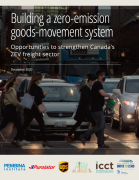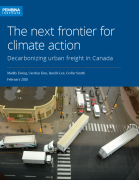The Urban Delivery Solutions Initiative is a national network of businesses and an environmental advocacy organization working to create an efficient and low-carbon urban freight system in Canadian cities.
Urban Delivery Solutions Initiative
A national network of businesses and organizations working to reduce freight emissions in Canadian cities.
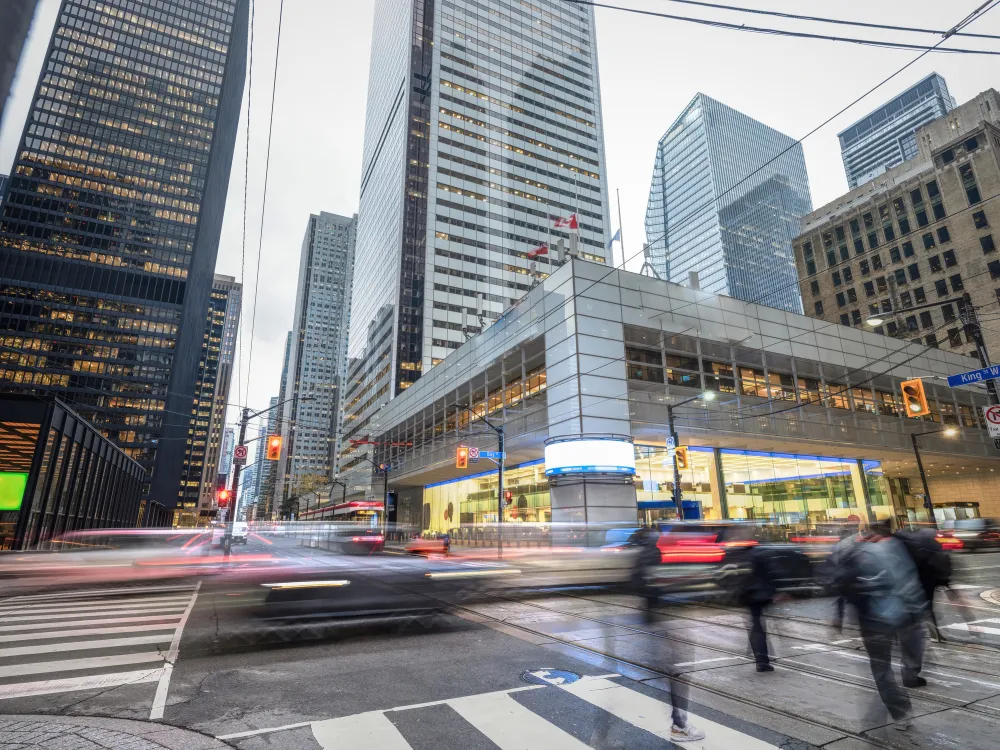
(Photo: Steven_Kriemadis/iStock)
Objectives of the Urban Delivery Solutions Initiative
Reduce
emissions during short-haul urban deliveries.
Promote
the use of zero-emission vehicles.
Increase
the national fleet of zero-emission vehicles and expand the necessary infrastructure.
Improve
curbside management practices to make deliveries easier and more efficient.
Support
governments, and government officials, at all levels to drive the transition to zero emissions in urban delivery.
Why we do what we do
Increasing access to urban-freight data can strengthen the development of low-carbon policy solutions.
- Canada’s e-commerce sector is growing, and the number of delivery trucks and vans on the streets of Canada’s cities is growing along with it.
- The COVID 19 pandemic prompted more Canadians to buy online, increasing truck traffic in urban areas.
- Now is the time to consider what the increase in delivery trucks is doing to the air that Canadians breathe, and the impact those vehicles are having on global warming.
- The current ad hoc, city-by-city approach to solving the urban freight problem means municipalities and businesses are constantly reinventing the wheel.
- By coming together and sharing knowledge, ideas, and best practices, cities can quickly introduce solutions in concert with business and other levels of government, saving time and valuable resources.
- Businesses stand to gain substantially from a national approach, particularly those that have multi-province and/or national operations.
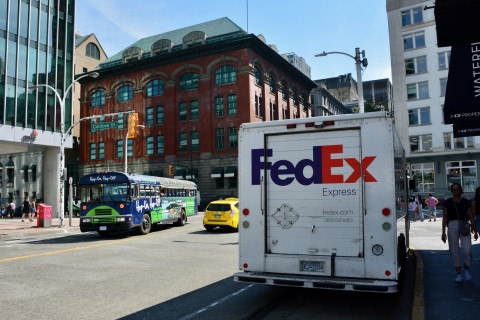
Benefits to joining
- Connect with other industry leaders and share best practices
- Explore and understand the critical pathways to achieving more efficient and sustainable urban freight activity
- Communicate to governments the necessary policies to modernize urban freight operations in Canada

Our impact
Together, the coalition employs more than 100,000 Canadians and operates more than 24,000 vehicles from coast-to-coast delivering goods to businesses and people. Coalition partners delivered billions of packages and goods globally in 2019.
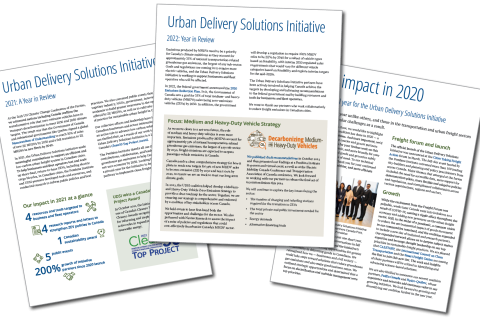
Stories from our partners
Canada Post
Canada Post is already incorporating electric vehicles, alternative-fuel vehicles, and charging stations into its fleet, and is looking to expand the use of those technologies. “Covid-19 has literally jumped e-commerce three or more years into the future. It is completely transforming our business,” says Chad Schella, the Crown corporation’s general manager for government and community affairs.
“We have one of the largest fleets in Canada and we are looking right now to modify that fleet,” says Schella. “We’re looking at how we transport mail in a way that is more green and to lower our carbon footprint.”
Governments could assist that effort by helping to build some of the infrastructure required for the transition, he says. “If there were commercial charging stations available in not just urban but suburban or rural settings that would make it more efficient for us to quickly adapt our fleet,” says Schella.
Canada Post joined the coalition because it is important to take a leadership role “with like-minded partners who are looking ahead to the future,” he says. “With UDSI we are able to share open conversations with other partners to see what challenges are common to us all, and also to identify common opportunities, and solutions for problems down the road.”
Fresh City Farms
Fresh City Farms connects member farmers who grow vegetables, herbs and flowers to customers in Canada’s largest city. Sustainability is one of its mottos. Even though its operations are localized to Toronto, it has joined the Initiative to learn from bigger national and international members about ways to make its deliveries more green.
“We are finding that electrifying our fleet is still too expensive so we would like to push for cheaper solutions in the near future,” says Chen Goel, the chief logistics officer.
Fresh City Farms is preparing to revisit a partnership with another company to do deliveries in the Toronto downtown core with electric bikes. “We have tried it in the past. It wasn’t as efficient as we would have liked but we do want to give it another try,” says Goel.
The cost of transitioning to electric is a major challenge for smaller delivery companies, he says. “Companies need to get to the right price point to make it work. We’re not there yet but I think we will be soon.”
Purolator
Purolator has a fleet of hybrid electric vehicles and is now looking at other sustainable, alternative-transportation modes including electric low-speed vehicles and electric cargo bikes.
The company has created automated parcel lockers at high-rise buildings and introduced mobile quick stops for freight delivery in places where there is no easy access to Purolator drop-off location. It is also exploring the concept of autonomous parcel lockers, and parcel-delivery robots for underground city and mall deliveries.
Purolator hopes the coalition will help cities understand the need to change regulations that are barriers to further emissions reductions in urban delivery, says Mary de Guzman, the senior national manager for corporate social responsibility and sustainability.
“We have been restricted, for example, in using our e-cargo bikes in the city of Toronto because we don’t meet restrictions for using the bicycle lanes. But we do meet those restrictions in Quebec cities such as Montreal,” says de Guzman.
Purolator hopes to see larger time windows for deliveries to reduce idling, zoning that allows for urban consolidation platforms, and permissions for freight distribution clusters, she says.
Anureet Kaur, a corporate social responsibility consultant at Purolator, says the Initiative provides an opportunity to build knowledge capacity, share best practices “and learn, as an industry within the Canadian context, how can we reduce barriers in adopting electric vehicles and other sustainable fleets.”
UPS
More than 40 per cent of UPS Canada’s vehicle fleet are powered by alternative fuels, a combination of propane and natural gas. The company also employs smart routing to consolidate deliveries and uses technology solutions such as UPS My Choice that offers customers more choice and control over package deliveries. For final mile delivery, UPS Canada delivers by package car, walkers, and has also tested the use of cargo bike delivery.
“All of these initiatives combined reduce the number of kilometres driven by our vehicles, while allowing UPS Canada to meet the growing final mile delivery needs of Canadian businesses and residents”, says Aylin Lusi, vice president of public affairs for UPS Canada.
Allison Gifford, director of public affairs for UPS Canada, says “UDSI fosters a valuable forum for dialogue between stakeholders in transportation and delivery, bringing representatives from all levels of government, the private sector, and non-government organizations to work together on some of the most pressing challenges for our sector. UPS Canada appreciates the leadership role the Pembina Institute has played by enabling dialogue between practitioners, subject matter experts and policy-makers across Canada. By working together, we will identify a path forward for the future of urban delivery.”
CALSTART’s Drive To Zero Program
CALSTART is a U.S.-based non-profit organization working nationally and internationally with businesses and governments to develop clean, efficient transportation solutions.
Cristiano Façanha, CALSTART’s global director, says the implementation and commercialization of zero-emission commercial vehicles will be done in stages and that will start with urban buses and delivery vans. “Zero-emissions technologies — the batteries, components and power trains — can be leveraged from urban vehicles to larger trucks over larger distances,” says Façanha. “So urban delivery vans are a really good way to start.”
In addition, he says, it is urban areas that are feeling the most acute effects air pollution. Reducing truck emissions in cities will cut smog as well as slow the speed of climate change.
Canada, certain regions of the U.S. (California in particular), Europe and China are leading the drive to zero-emission commercial vehicles, says Façanha. But there is still a need for better policies, financial incentives, infrastructure investments, and pilot projects, he says, “so governments really need to put together these ecosystems of support and work collaboratively across different regions to build scale in the marketplace and accelerate the process.”
That’s why this coalition is so important, says Façanha. “Focussing on urban freight and bringing together different stakeholders to impact change in one of the leading regions of the world, is a significant part of the puzzle.”
International Council on Clean Transportation (ICCT)
The International Council on Clean Transportation is a non-profit organization that provides research and technical and scientific analysis to improve the environmental performance of the transportation sector.
Ben Sharpe, ICCT’s senior researcher and Canada lead, says much attention in this field is rightly being put toward passenger-vehicle electrification but trucks are the next great frontier.
“Urban freight, in particular, is ripe for electrification given that cities are conducive in terms of duty cycle, charging and refuelling needs,” says Sharpe. “We are already seeing it in many jurisdictions where electric trucks are first starting to hit the market in these urban delivery applications.”
Canada’s cold climate means there are special technological issues to consider as the move to zero emissions progresses, and that that makes the Urban Delivery Solutions Initiative, which focuses on the Canadian context, an important player in terms of research, advocacy, and outreach, says Sharpe.
“The leadership in electric vehicles is absolutely in transit busses,” he says. “But increasingly, cities are realizing that there is no way to hit climate sustainability goals without putting tremendous effort on trucks. So, from an international perspective, there are several leading cities and states and provinces that are really doing some hard thinking about how we get these electric trucks developed and deployed as quickly and smartly as possible.”
Smart Freight Centre
The Smart Freight Centre’s mission is to improve the vibrancy of business, environmental sustainability, and quality of life for residents of the Greater Toronto and Hamilton Area by engaging in open space research that supports efficient, sustainable and equitable freight transportation.
Transportation is a huge component of greenhouse gas emissions and freight is a major contributor to greenhouse gas within the freight sector, says Matt Roorda, the chair of the centre.
“We all enjoy products in our retail stores,” says Roorda. “But, at the same time, we want to reduce our impact on the climate. We are already seeing so many outcomes of climate change with the wildfires in the west and extreme events like hurricanes in the south of the United States.”
Around the world, much research is being done on reducing the impact of freight movement on the environment, and also on ways of making goods movement more efficient and supply chains more sustainable says, Roorda.
The Urban Delivery Solutions Initiative is providing leadership in the decarbonization of freight, he says. “If we work in silos we're not going to come up with solutions that are practical on the ground,” he says. So an initiative like the coalition “is great for bringing people together and continuing the conversation.”
Award-winning
UDSI, a first-of-its-kind coalition, has been awarded a prestigious Canada’s Clean50 Top20 Project Award.
Read about the awardKey Research & Analysis
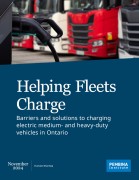
Helping Fleets Charge
Barriers and solutions to charging electric medium- and heavy-duty vehicles in Ontario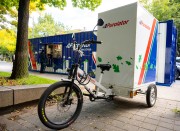
The sustainable city
#ZEV-life: Canada’s largest municipality leans into e-mobility
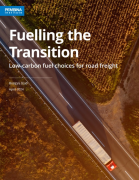
Fuelling the Transition
Low-carbon fuel choices for road freight

Carbon-free and cost-effective, FedEx Express e-bikes deliver the goods
#ZEV-life: Stories from fleets making the switch

Lion Electric leading the transition to zero-emission vehicles
#ZEV-life: Stories from fleets making the switch
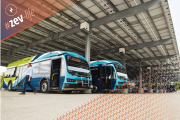
A plug-and-play option for a county’s transit needs
#ZEV-life: Stories from fleets making the switch

Flat-packing and ZEVs: IKEA helps consumers make low-GHG choices
#ZEV-life: Stories from fleets making the switch

Clean garbage trucks? A municipality in Quebec is giving them a try
#ZEV-life: Stories from fleets making the switch
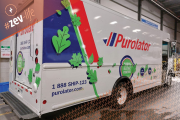
Purolator “steps up” to innovate for the climate
#ZEV-life: Stories from fleets making the switch
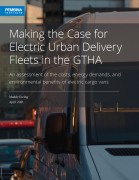
A guide to electrifying urban delivery fleets in Canadian cities
Why and how last-mile delivery companies should make the switch to electric vehicles
Get our Pembina Perspectives
Pembina Perspectives provides thoughtful, evidence-based research and analysis to support action on climate — in your inbox every two weeks.
We endeavour to protect your confidentiality; read our full privacy policy.
Sponsors and supporters














